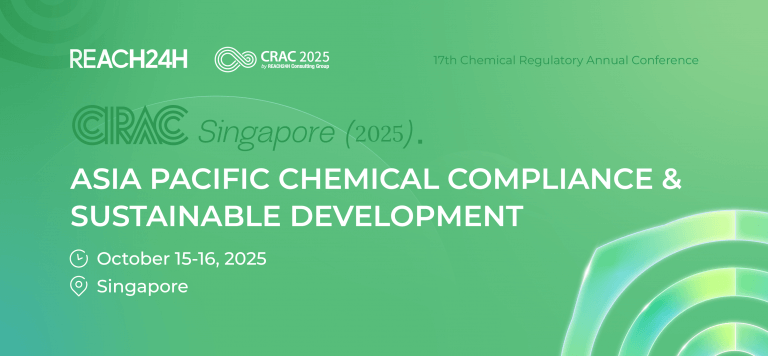A study published in Environmental Science & Technology in February 2020 estimated the total number of chemicals and mixtures on the global market registered for commercial production and use may exceed 350,000. By 2060, the chemical industry is expected to grow fourfold. A large number of chemicals are in commerce and many are in large volumes, for which safety data is needed. Chemical safety assessment has traditionally been based on animals testing, however, many regions around the world have taken actions to reduce or ban animals testing through amending regulations.Speaking at the CRAC-HCF 2021 held by REACH24H on November 9, 2021, Ms. Patience Browne, the Principal Administrator of the Organization for Economic Cooperation and Development (OECD), pointed out many testing methods may include a series of (sequential) experiments, each one of which may require months to years to execute and analyses data. Thus, only tens or hundreds (or maybe thousands at most) of chemicals can be evaluated per year by using these methods (mostly animal-based) for assessing safety of chemicals. We’re 21% through the 21st century, new methods (non-animal) were really needed, said Ms. Browne. Using non-animal methods for regulatory purposes can be promoted in a stepwise fashion, such as gaining more experience to build confidence, and articulating what kind of information is needed at each step in the process to move farther towards uptake and implementation in regulatory decision making.
Ms. Browne also introduced that there’re still obstacles in harmonizing alternative methods globally, e.g. the variability of methods in OECD countries, the fact that over 50% of chemicals were manufactured outside of OECD member countries, etc. Nonetheless, there’s increasing convergence on the alternative approaches around the world, and OECD is positioned in a way to help. She shared two tables on OECD guidance documents on alternative methods. It can be seen that OECD has released a variety of guidance documents and multiple non-animal test methods to evaluate chemicals, and they’re all publicly available on OECD websites. Besides, European Chemicals Agency (ECHA) published advice on October 13, 2021, which is based on the new OECD Test Guideline to registrants on how to combine different sources of non-animal data while assessing safety of chemicals, aiming to reduce animal testing while protecting human health. The OECD Test Guideline contains defined approaches for assessing the safety of chemicals. By using several types of combined information to provide chemical safety information, it helps replace the need for animal test data. Additionally, ECHA provides regulatory expertise and investing in worldwide platforms on chemicals data, such as AOP Knowledge Base and the QSAR Toolbox.
That is to say, EU REACH registrants can check whether they can use the defined approaches for chemical substances to make conclusive predictions and update their test data accordingly. For registrants who cannot make conclusive predictions, the OECD Test Guideline can help registrants select the most suitable test methods to generate new test data for chemical substances.
In addition to EU, many parts of the world are changing regulations which reduce or prohibit animal testing and require alternatives to evaluate chemical safety, such as India, South Korean, Australia, Mexico, Switzerland, Israel, European Union, Iceland, etc. ChemLinked also reported relevant news:
It can be seen that OECD has released a variety of guidance documents and multiple non-animal test methods to evaluate chemicals, and they’re all publicly available on OECD websites. Besides, European Chemicals Agency (ECHA) published advice on October 13, 2021, which is based on the new OECD Test Guideline to registrants on how to combine different sources of non-animal data while assessing safety of chemicals, aiming to reduce animal testing while protecting human health. The OECD Test Guideline contains defined approaches for assessing the safety of chemicals. By using several types of combined information to provide chemical safety information, it helps replace the need for animal test data. Additionally, ECHA provides regulatory expertise and investing in worldwide platforms on chemicals data, such as AOP Knowledge Base and the QSAR Toolbox.
That is to say, EU REACH registrants can check whether they can use the defined approaches for chemical substances to make conclusive predictions and update their test data accordingly. For registrants who cannot make conclusive predictions, the OECD Test Guideline can help registrants select the most suitable test methods to generate new test data for chemical substances.
In addition to EU, many parts of the world are changing regulations which reduce or prohibit animal testing and require alternatives to evaluate chemical safety, such as India, South Korean, Australia, Mexico, Switzerland, Israel, European Union, Iceland, etc. ChemLinked also reported relevant news:
- India:Enterprises are allowed to submit data from international sources, emphasizing the principle that existing test data shall be considered as a priority. (ChemLinked news)
- South Korea:The Ministry of Environment pushes on the plan to accelerate alternatives to animals testing in inspections of the hazardous chemical substances. (ChemLinked news)
- Australia:Ingredient toxicological safety data derived from animal testing on or after July 1, 2020, is no longer valid in applications to introduce new cosmetic ingredients in Australia. (ChemLinked news)
- Taiwan, China:Enterprises can enjoy reduction in dossier review fee for standard registration of new and existing chemical substances if the data of skin corrosion/irritation and eye irritation are generated by in vitro testing, QSARs or read-across approach. (ChemLinked news)
- China:China MEE solicited viable predictive modeling software of computational toxicology, which once adopted, will be used in the registration of new chemical substances, hazard screening of new pollutants, etc. (ChemLinked news)





